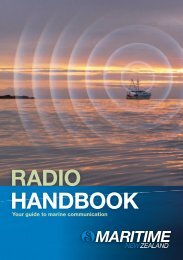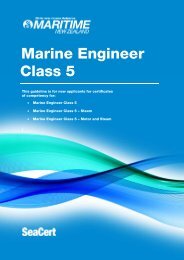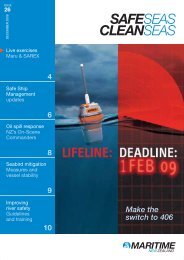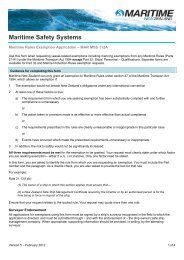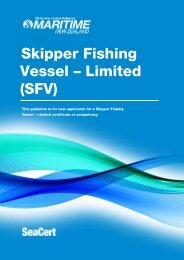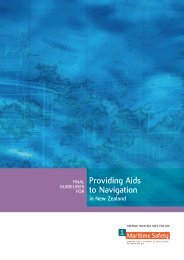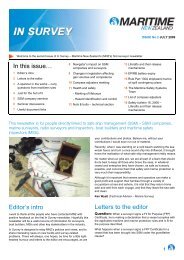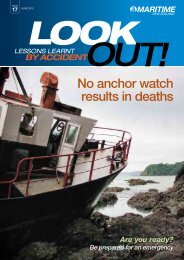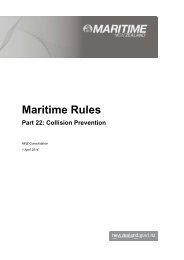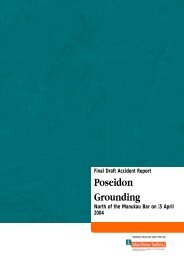New Zealand oil spill response strategy - Maritime New Zealand
New Zealand oil spill response strategy - Maritime New Zealand
New Zealand oil spill response strategy - Maritime New Zealand
Create successful ePaper yourself
Turn your PDF publications into a flip-book with our unique Google optimized e-Paper software.
On-scene commander (OSC)<br />
The person responsible for the control and management of the marine <strong>oil</strong> <strong>spill</strong> clean-up at Tier 2 or<br />
Tier 3. A regional on-scene commander (ROSC) is appointed by the relevant regional council (Tier 2),<br />
and the national on-scene commander (NOSC) is appointed by the Director (Tier 3).<br />
Oil transfer site<br />
Includes any land, site, building, structure or facility (whether on land or above the sea) that is used to<br />
transfer <strong>oil</strong>, or at or from which <strong>oil</strong> is transferred, to, or from, a ship or offshore installation (refer to<br />
section 281 of the Act). Note: Facility is considered here to include mobile transfer sites such as<br />
vehicles.<br />
Persistent <strong>oil</strong><br />
Oils and petroleum products such as crude <strong>oil</strong>s, fuel <strong>oil</strong>s and lubrication <strong>oil</strong>s that, when spilt, remain<br />
after weathering in a residual form in the environment for an appreciable period.<br />
Place of refuge<br />
A place where a vessel can safely anchor or berth to enable measures to be taken to forestall or<br />
minimise the effects of damage (e.g., to minimise the leakage of <strong>oil</strong>). Also known as a ‘safe haven’.<br />
Prevention of a marine <strong>oil</strong> <strong>spill</strong><br />
Any action taken during the normal operation of a ship, offshore installation, pipeline, or <strong>oil</strong> transfer<br />
site to lower the likelihood of a marine <strong>oil</strong> <strong>spill</strong> occurring.<br />
Regional Councils<br />
All the regional councils, plus those unitary authorities (District Councils) with the powers and functions<br />
of a regional council. They are:<br />
Northland Regional Council, Auckland Regional Council, Environment Waikato, Environment Bay of<br />
Plenty, Gisborne District Council, Hawke’s Bay Regional Council, Horizons (Manawatu-Wanganui<br />
Regional Council), Taranaki Regional Council, Wellington Regional Council, Marlborough District<br />
Council, Tasman District Council, West Coast Regional Council, Nelson City Council, Southland<br />
Regional Council, Canterbury Regional Council, Otago Regional Council, Chatham Islands Council.<br />
Regional Marine Oil Spill Contingency Plan<br />
A marine <strong>oil</strong> <strong>spill</strong> contingency plan prepared by a Regional Council and approved by the Director<br />
under section 292 of the Act 1994. It is sometimes referred to as a Regional Plan.<br />
Rescue Co-ordination Centre <strong>New</strong> <strong>Zealand</strong> (RCCNZ)<br />
National service centre operated by <strong>Maritime</strong> <strong>New</strong> <strong>Zealand</strong>, which provides a 24-hour alert for maritime<br />
incidents and accidents, including <strong>oil</strong> <strong>spill</strong>s, search and rescue, at sea collisions, etc.<br />
Response escalation criteria<br />
The factors and issues to be taken into account when determining whether or not it is appropriate for a<br />
lower tiered incident to be declared to be and managed as a higher tiered <strong>response</strong> (i.e., local Tier 1,<br />
to regional Tier 2, or national Tier 3 <strong>response</strong>).<br />
Risk<br />
An index of values derived from assessment of possible <strong>oil</strong> <strong>spill</strong> scenarios, where the risk equates to<br />
the probability of a particular event occurring, multiplied by a value that represents the magnitude of<br />
the impact that the event would create.<br />
Risk = Probability x Consequences<br />
Safe haven<br />
See ‘place of refuge’.<br />
Shipboard Oil Pollution Emergency Plan (SOPEP)<br />
A plan prepared under Marine Protection Rules which implements the MARPOL 73/78 requirements, to<br />
specify the measures to be taken in respect of an <strong>oil</strong> <strong>spill</strong> from the ship. Sometimes referred to as a<br />
shipboard plan or SOPEP.<br />
Site Marine Oil Spill Contingency Plan<br />
A plan prepared under Marine Protection Rules for any <strong>oil</strong> transfer site or pipeline which specifies the<br />
measures to be taken in respect of a marine <strong>oil</strong> <strong>spill</strong>. Sometimes referred to as a Site Plan.<br />
40





